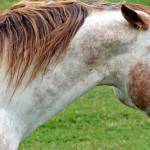Question
I have a 15-year-old Quarter Horse gelding whose pedigree traces to Impressive. He has bouts of colic four to five times a year since I’ve owned him, and I’ve had him about six years now. His AQHA registration papers note that he tested negative for hyperkalemic periodic paralysis (HYPP). I had bloodwork done last week, and his potassium level is very high. The cause of his colic confounds us. His diet includes coastal hay, soaked alfalfa pellets, electrolytes, probiotics, omeprazole, and ranitidine. I recently removed the commercial electrolyte from his diet, because it contained 11% potassium, and I replaced it with plain salt. I am contemplating switching him to plain oats with Micro-Max while continuing to feed coastal hay. He is boarded at a facility that has pasture turnout, primarily coastal grass to graze in the summer and ryegrass in the winter. Any help is appreciated!
Answer
Based on his recent test results, it is wise to limit potassium to less than 1% in the diet. Legumes, including alfalfa (lucerne), tend to have a higher potassium content, so it is best to discontinue the alfalfa pellets. Although coastal hay is low in potassium, it has been linked to colic in some horses. It may be worth transitioning him to another low-potassium hay, such as timothy. It is important to make any hay or feed changes gradually to allow the digestive tract and its resident microbial population to adjust.
As you mentioned, feeding oats and a micronutrient supplement, like Micro-Max, is an appropriate low-potassium diet. Horses prone to colic and hindgut acidosis do best on low-starch diets. If he requires a large amount of grain to meet his energy needs, you may want to consider another low-potassium option that also contains minimal starch. If he only needs a pound or two of oats to maintain body condition, then it should not be a concern. Regardless of feed type, it is best for digestive health to split feed into several meals throughout the day instead of one or two large meals. It is also important for him to have hay or pasture available throughout the day to keep the digestive tract functioning properly. Consistent movement and turnout is recommended to maintain digestive motility.
KER’s EquiShure, a unique supplement designed to balance the pH in the hindgut, has been very helpful for horses with unexplained colic episodes. EquiShure can be used in combination with omeprazole and ranitidine.








